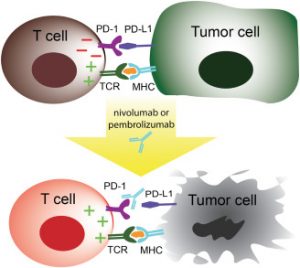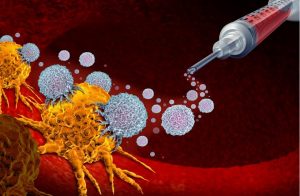41 2.3: Immunotherapy: Successes & Limitations
What is Immunotherapy?
Immunotherapy involves the use of the body own immune system to fight cancer (Cohen 1). Immunotherapy can include gene therapy, checkpoint blockades, targeted antibodies, and can be used in addition to other cancer treatments such as chemotherapy, radiation, or surgery (Cohen 1). Immunotherapy trains the immune system to recognize and attack cancer cells, potentially giving long lasting protection against cancer reoccurrence (immuno-memory), and can be used against many different forms of cancer, including more aggressive forms such as melanoma and brain cancer (Cohen 1).
Figure 6: A video explaining cancer, the immune system, and immunotherapy
Immunotherapy Successes
Checkpoint blockade therapy has been used as a novel therapy to treat melanoma and glioblastoma while all others have failed (Cohen 1). Immunotherapy has been shown to increase the effects of other cancer treatments taken with it including chemotherapy, which can increase the lifespan and improve symptoms of someone with an aggressive form of cancer, as well as creating less side effects than traditional treatments because it only targets your own immune system (Cohen 1). In particular, checkpoint blockade therapy has been extremely beneficial to those suffering from cancer and has undergone various development in research and the clinic (Wolchok 1). A specific checkpoint blockade targeting PD1/PDL1 has been used in many different immuonherapies, especially in those targeting the most aggressive forms of melanoma including Atezolizumab (Tecentriq®), and glioblastoma using Pembrolizumab (Keytruda®) (Wolchok 1). These immunotherapies target PD1 which is found on T-cells. PD1 can bind to PDL1 (found on some cancer cells), the T cell then becomes inactivated and the cancer evades the immune system (Schmidt 1). When immunotherapies target PD1, binding to PDL1 is inhibited and the cancer cell can then be destroyed by the immune system (Schmidt 1).

Definitions
Glioblastoma– A type of brain cancer which begins in glial cells of the brain, specifically astrocytes, which an occur in the brain or the spinal cord.
Melanoma- A type of skin cancer which develops form the cells of the skin that produce pigment, called melanocytes.
Limitations of Immunotherapy
Unfortunately, limitations come with the successes of Immunotherapy. These include the inability to predict each patients response to treatment, development of resistance, and high treatment costs (Ventola 514). Some immunotherapies are only effective if used on certain types of cancers, and on specific patients as well, which can limit the efficacy of immunotherapies (Ventola 514). This can be due to different biomarkers that are expressed, the stage that the cancer is in, tutor heterogeneity, only targeting one pathway involved, and the patients treatment history (Ventola 514). Because cancer signalling networks are adaptive, resistance to immunotherapy can occur, disrupting treatment (Ventola 517). Resistance can occur by genetic mutations in the drug target that can cause the reactivation of a cancer pathway, epigenetic or transcriptional changes, or by activating other pathways that create resistance (Ventola 517). Lastly, immunotherapy can be very expensive, as the cost for a patient to receive pembrolizumab for one year varies between $130,00-$145,000 (Ventola 517). This is why patients, healthcare providers, and pharmaceutical companies must work together in order to provide safe and affordable immunotherapy drugs (Ventola 518).

Test your knowledge:
